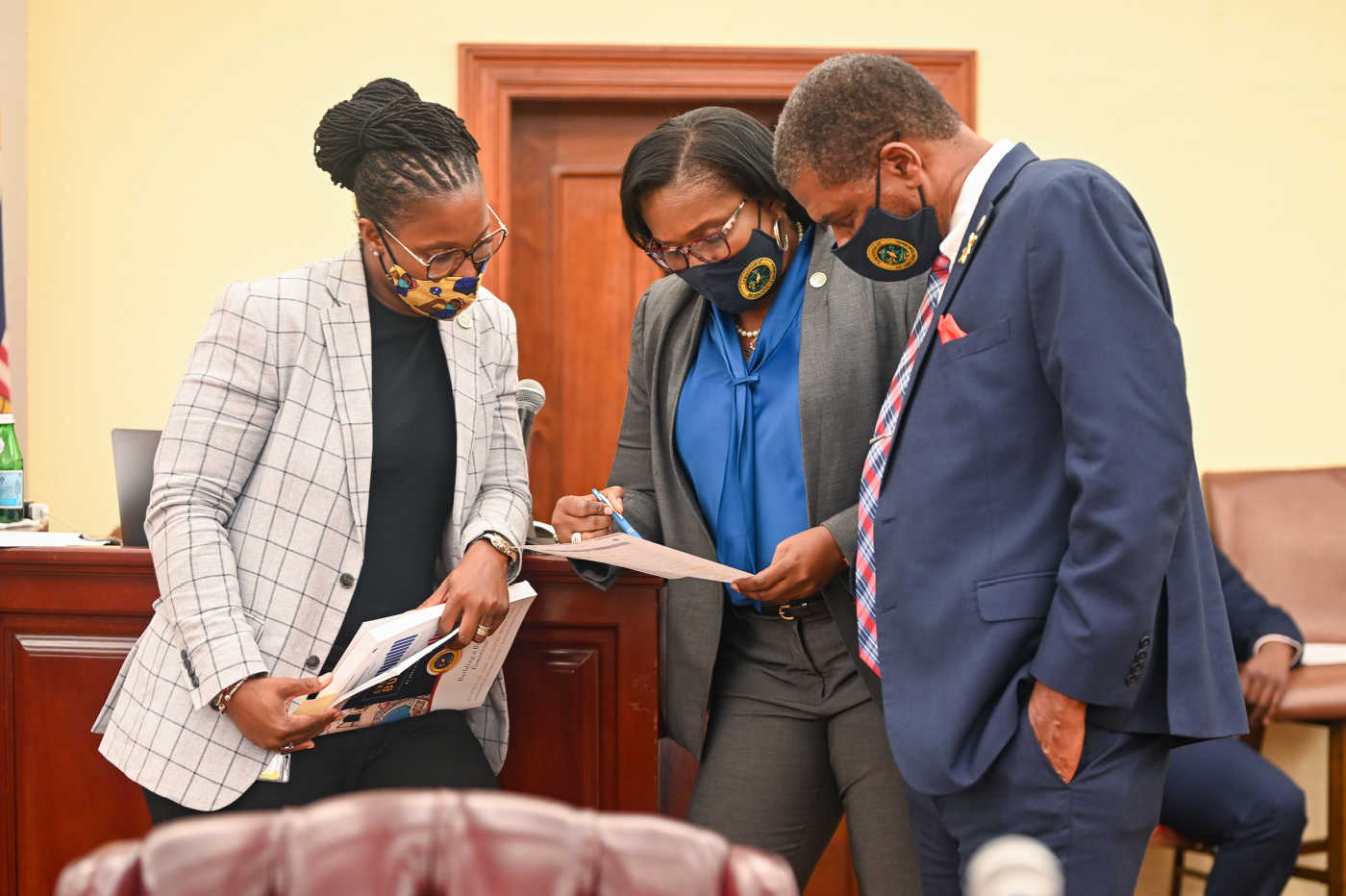0 Photo Credit: GETTY IMAGES
Senate President Donna Frett-Gregory on Thursday said the lack of funding in Governor Albert Bryan's latest budget proposal for the Government Employees' Retirement System was “the elephant in the room," and that it is the responsibility of all branches of government to save the system from going insolvent.
![]()
Ms. Frett-Gregory, speaking during the budget overview hearing, stated, “We are in a prime position scheduled to receive almost $600 million dollars in [American Rescue Plan] funds, and the 2022 budget that was submitted to the Legislature, our primary focus is on utilizing our general funds revenue for the most part to address government operations, but we have not in this budget made any reference to how we are going to deal with the elephant in the room. And the elephant in the room of course is the Government Employees' Retirement System.”
She further explained, “It is our responsibility, it is the Legislature's responsibility as well as the executive branch's responsibility to ensure that we do what we have to do to stave off insolvency."
According to U.S. rating agency Moody, G.E.R.S. will likely collapse in 2023 after depleting assets and be forced to cut retirees' benefits by 50 percent, a move that the firm said is unthinkable politically and instead would be the driving force of a government debt default and restructuring.
Ms. Frett-Gregory found cause for concern on the lack of a plan for the pension system. “In a presentation for a two-year budget we did not give any consideration to how government is going to take on some of this burden in the associated fringe benefits category as it relates to G.E.R.S. That is troubling.”
 From left: Senators Janelle Sarauw, Donna Frett-Gregory and Kurt Vialet peruse budget documents during a budget overview hearing in the Committee on Finance, chaired by Mr. Vialet, on Thursday, June 3, 2021. (Credit: Chaunte Herbert, Legislature of the Virgin Islands)
From left: Senators Janelle Sarauw, Donna Frett-Gregory and Kurt Vialet peruse budget documents during a budget overview hearing in the Committee on Finance, chaired by Mr. Vialet, on Thursday, June 3, 2021. (Credit: Chaunte Herbert, Legislature of the Virgin Islands)
Office of Management and Budget Director, Jenifer O’Neal, agreed with Ms. Frett-Gregory, but said the plan must be holistic. “I will agree with you that the G.E.R.S. problem is one that needs to be solved, addressed and it is going to take all of us and it can’t be piecemeal. It needs to be a collective, strategic, well thought-out plan and then we take action on that plan. It’s going to take all branches working together to come up with a plan that works," she said.
Ms. Frett-Gregory agreed with Ms. O'Neal, but added, "What is important is if we have opportunities we need to utilize them," again pointing to the two-year budget proposal and the administration's lofty projections — none of which considers supporting the near-death pension system.
Senator Kurt Vialet followed up, "We will be addressing this situation in the FY 2022 budget," he said. "We do have some pieces of legislation that will provide additional funding for G.E.R.S."
Mr. Bryan last year proposed a debt restructuring plan that he said would have resulted in hundreds of millions of dollars in savings. Yet though he contended the funds would be used to undergird G.E.R.S., the governor also said a portion of the savings would have been expended on other priorities, including infrastructure.
Ultimately, senators rejected the plan, with some sticking to their stance that the measure was not in the best interest of the territory; some contending that the refinancing, contrary to what was being said, was not certain to go toward saving the G.E.R.S., while others, including Mr. Vialet, contending that the deal — which would have dissolved the territory's $150 million Debt Service Reserve Fund — would affect future generations as it would have deferred payments and place a heavy burden on Virgin Islanders ten years down the road.
Senator Dwayne DeDgraff during Thursday's hearing sought information on Act 8383, which obligates the government to remit to G.E.R.S. 50 percent of excess revenue realized by the government during the current fiscal year, which ends on Sept. 30, 2021.
Mr. DeGraff, chief sponsor of the excess revenue measure, has said that during a February 16, 2021 Committee on Finance meeting, Ms. O’Neal indicated that the G.V.I. had collected $885.8 million, which was about $10.8 million more than the anticipated revenue projected for FY2020. As per the law, G.E.R.S. should have collected $5.4 million of the excess funds, but according to G.E.R.S., none of the aforementioned sum had been paid.
Act 8383 was brought up later during Thursday's hearing when Ms. Frett-Gregory asked Ms. O’Neal what happens to excess revenue at the end of the fiscal year. “Typically we don’t do anything with it," she responded. "If it's actually cash it stays in the account.”
Ms. Frett-Gregory sought to learn how legislators could remain abreast of the excess revenue, because “we should be in a position where we are able to obligate if we choose to appropriate against those funds in an ensuing fiscal year," she said.
Ms. O’Neal agreed, “In some cases we overspend and in some cases we have extra money. So we should come back and that’s one of the things I am discussing with the team to see how we make that happen going forward.”
Mr. DeGraff pounced, "We have a place for you to send it — to G.E.R.S."

